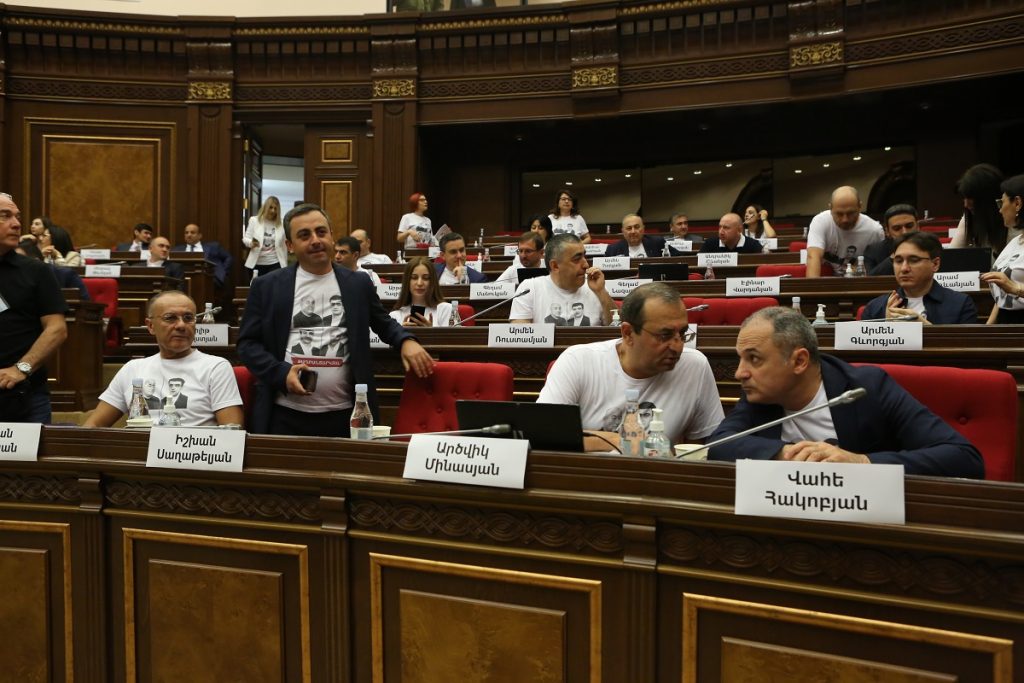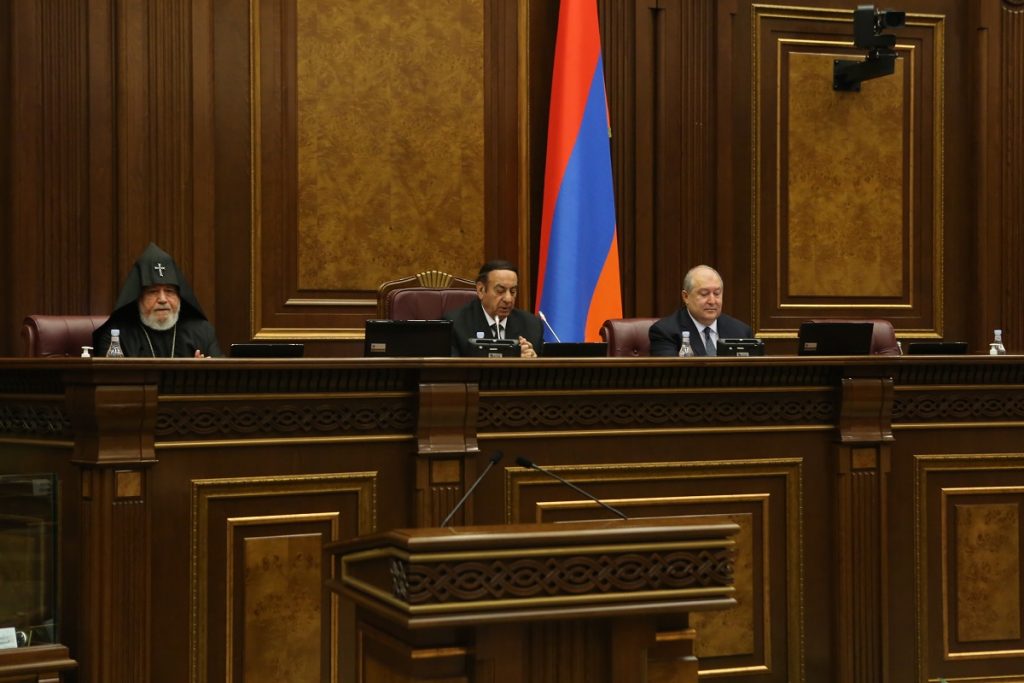Armenian opposition boycotts first session of the newly elected parliament
The first session of the newly elected parliament was held in Armenia on August 2. As a result of the early parliamentary elections of June 20, three political forces were able to win the mandates, two of which represent the opposition that demanded the resignation of Prime Minister Nikol Pashinyan before the parliamentary elections, immediately after the country’s defeat in the second Karabakh war.
The opposition deputies have announced that they will continue to fight for the incumbent prime minister’s departure from office.
“Having come to the National Assembly, we did not abandon our main demand – these authorities must leave. Parliament is an additional tool that we use to achieve our goal”, said the leader of the I Have the Honor bloc Artur Vanetsyan.
The parliament session was held in a tense atmosphere – every now and then there was a verbal skirmish between representatives of the ruling force and the opposition.
MPs from the Hayastan opposition bloc (Armenia) organized a political flashmob in support of their colleagues, Mkhitar Zakaryan and Artur Sargsyan, who were arrested shortly after the elections. They came to the parliamentary session in white T-shirts with photographs of their arrested colleagues. Despite winning seats in parliament, the arrested were unable to participate in the parliamentary session.

Both are accused of embezzlement of public funds and abuse of office but opposition figures denounce their arrest as political persecution.
Three candidates were nominated for the post of speaker of the Armenian parliament, including two MPs that are currently being held under arrest. During the presentation of the candidacy for the post of the speaker from the ruling Civil Contract faction Alyon Simonyan, all members of the opposition blocs left the meeting hall in protest.
Meanwhile, the President has already signed a decree on the appointment of the Prime Minister. According to the constitution, the appointment must take place immediately after the start of the term of office of the newly elected National Assembly. The prime minister is the candidate of the parliamentary majority, in this case, the Civil Contract party. As expected, the party nominated its leader Nikol Pashinyan for the post of prime minister.
The parliament of the eighth convocation includes 107 deputies. The ruling Civil Contract party received 71 mandates, the Hayastan (Armenia) bloc of ex-president Robert Kocharian – 29, and The Honor bloc of ex-president Serzh Sargsyan and former head of the National Security Service Artur Vanetsyan – 7.
- Is the opposition being targeted in the Syunik region of Armenia?
- Op-ed: repeated elections, Karabakh issue, return of prisoners
The first session of the new parliament
At the beginning of the session, the deputies honored the memory of those killed during the second Karabakh war with a minute of silence. Then the Catholicos of All Armenians Garegin II and the President of Armenia Armen Sargsyan addressed the National Assembly.

According to the regulations, the Armenian parliamentarians took the oath and the leader of the meeting, a deputy from the ruling force, a representative of the Kurdish community of Armenia, Prince Hasanov, began to read out the names of the deputies from each faction.
When he got to the names of the arrested deputies, opposition representatives stood up and applauded loudly.
After the official part, the opposition MPs from the Armenia bloc demanded that the arrested colleagues be brought to the parliament. They stated that they cannot elect the leadership of the National Assembly when two deputies are under arrest and are absent. The I Have the Honor bloc supported this demand.
While Prince Hasanov unsuccessfully tried to continue the meeting, the oppositionists beat their hands on the table.
Speaker of parliament candidates
According to the regulations, all three candidates for the post of speaker were supposed to appear in parliament, including the arrested opposition MPs. After the nomination, the opposition blocs demanded that Prince Hasanov ensure the presence of Mkhitar Zakaryan and Artur Sargsyan at the meeting, referring to the country’s regulations. Otherwise, as opposition MPs argued, the candidates would find themselves in an unequal position.
But the moderator of the meeting said that it was “not in his competence” to meet this demand.
As a result, all members of the opposition blocs defiantly left the meeting hall.
Prosecutor General’s Office statement about the arrested MPs
Mkhitar Zakaryan is the former mayor of the city of Meghri in the Syunik region of Armenia. The second arrested deputy, Artur Sargsyan, is the former mayor of the city of Sisian in the same region. Both were charged with abuse of office and forgery.
However, many in Armenia believe that both are being persecuted because of their opposition views. During the pre-election campaign, they openly and harshly criticized acting Prime Minister Nikol Pashinyan and the party he leads.
In general, many in the Syunik region are dissatisfied with the policy of the authorities. The situation escalated in the fall of 2020 when after the second Karabakh war, the territories previously controlled by Armenia came under the control of Azerbaijan. Many villages here have become borderlands, as in the days of the USSR.
Some villages were divided into two parts – Armenian and Azerbaijani, thus sparking numerous protests in the region. Local residents even opposed Nikol Pashinyan’s visit to the region.
It is believed here that the protection of the border area was provided by the leaders of local communities, who are now accused of various violations and end up in prisons. Oppositionists regard this situation as political persecution.
The members of the Armenia bloc noted that, according to the constitution, criminal prosecution against a deputy can be initiated only with the consent of the parliament and the consequent stripping of the MP immunity.
The Prosecutor General’s Office stated that the consent of the deputies is not required if a criminal case was initiated even before their election and the opposition MPs were imprisoned with the consent of the Central Election Commission and there was no need to obtain the consent of the National Assembly on the same issue.
However, both the opposition and experts believe that, according to the constitution, the Prosecutor General must have obtained the consent of the National Assembly in order to continue the criminal prosecution against the already elected deputies.
As a result, a representative of the ruling party was elected as the speakerparliament. Voting by the opposition could not change the situation, since the ruling party has the necessary number of mandates to make decision.



















